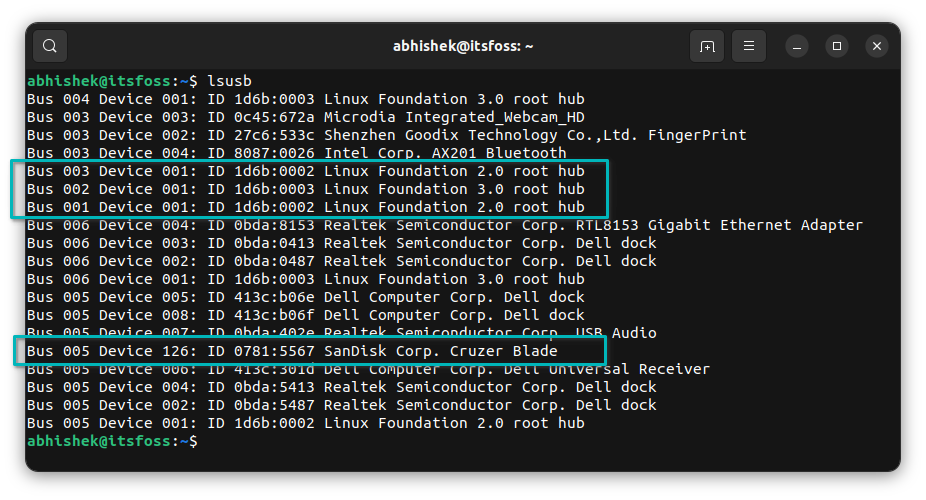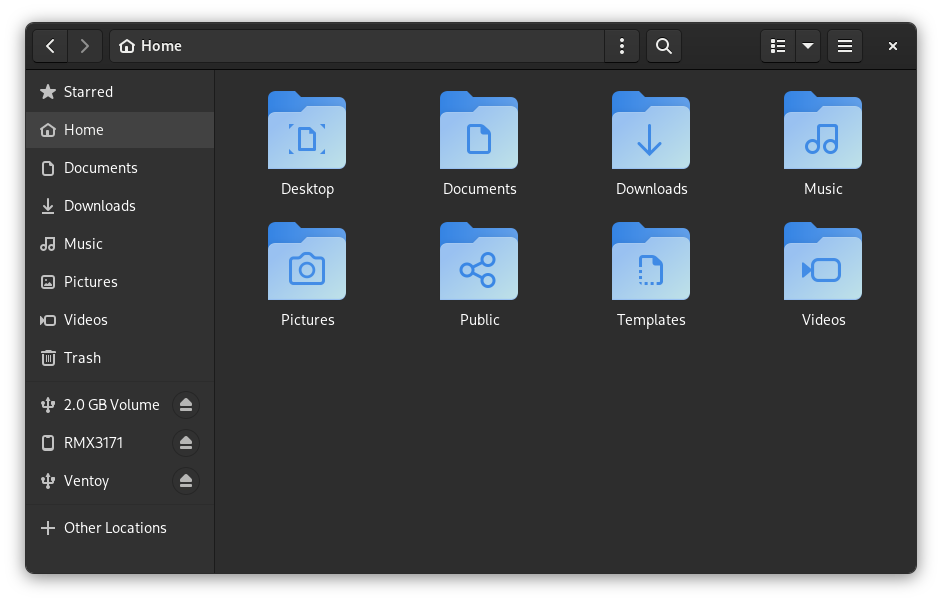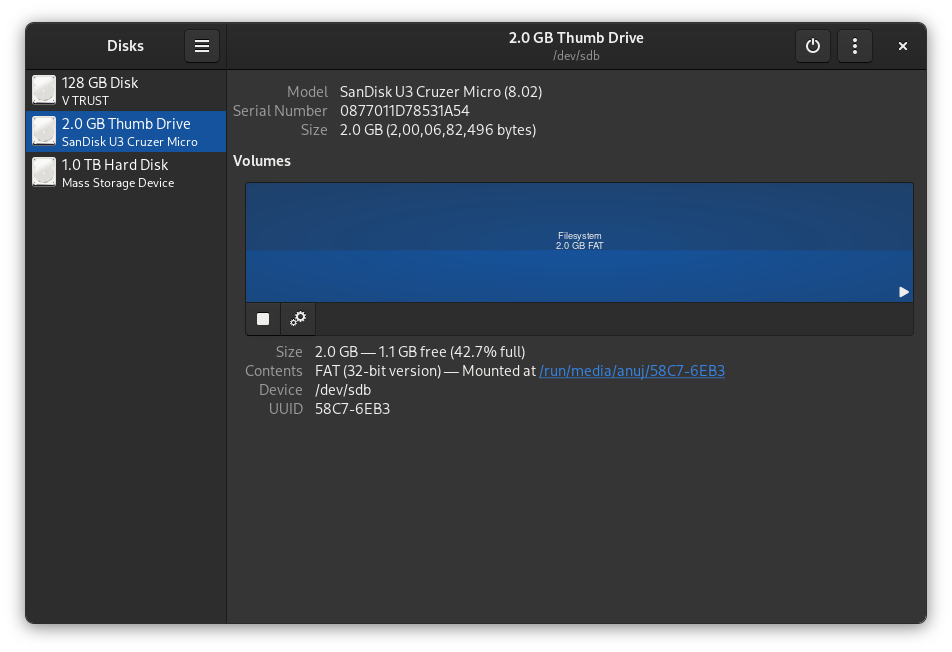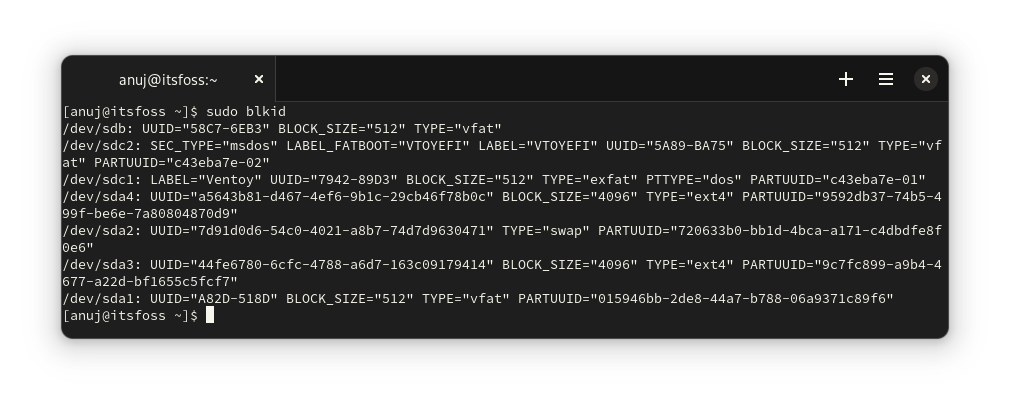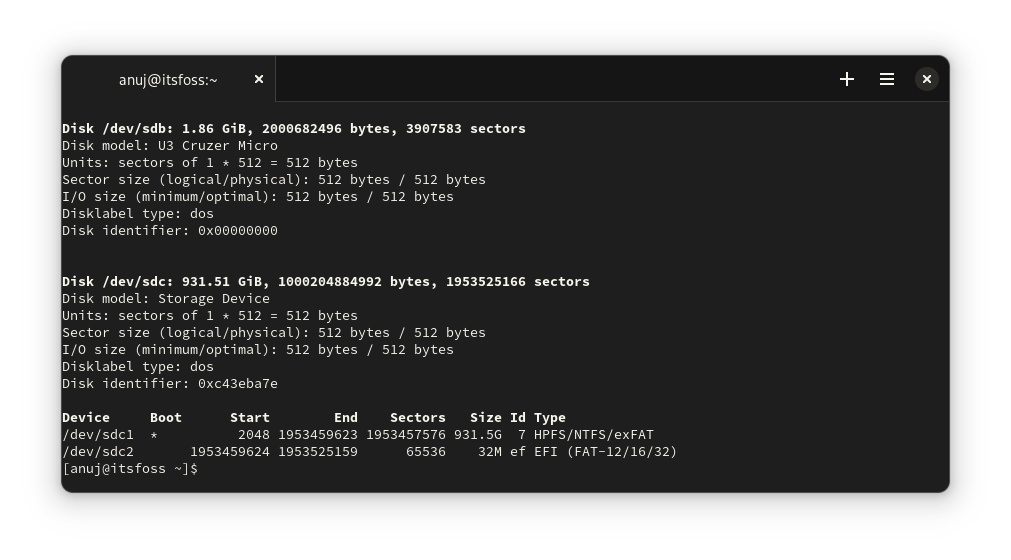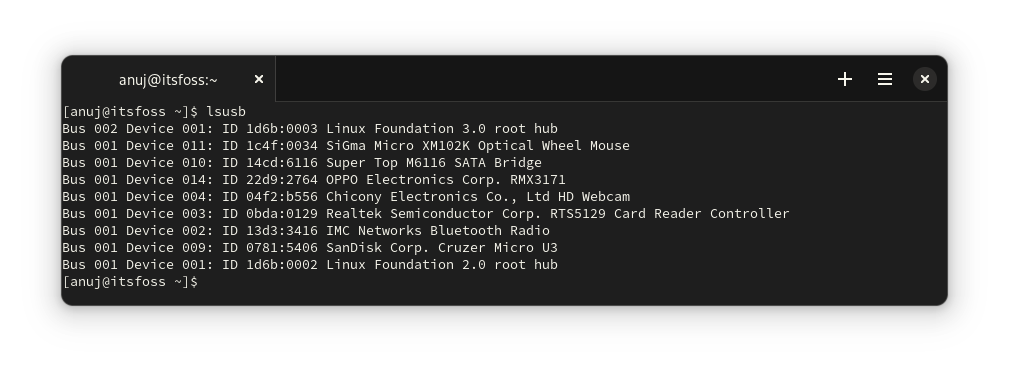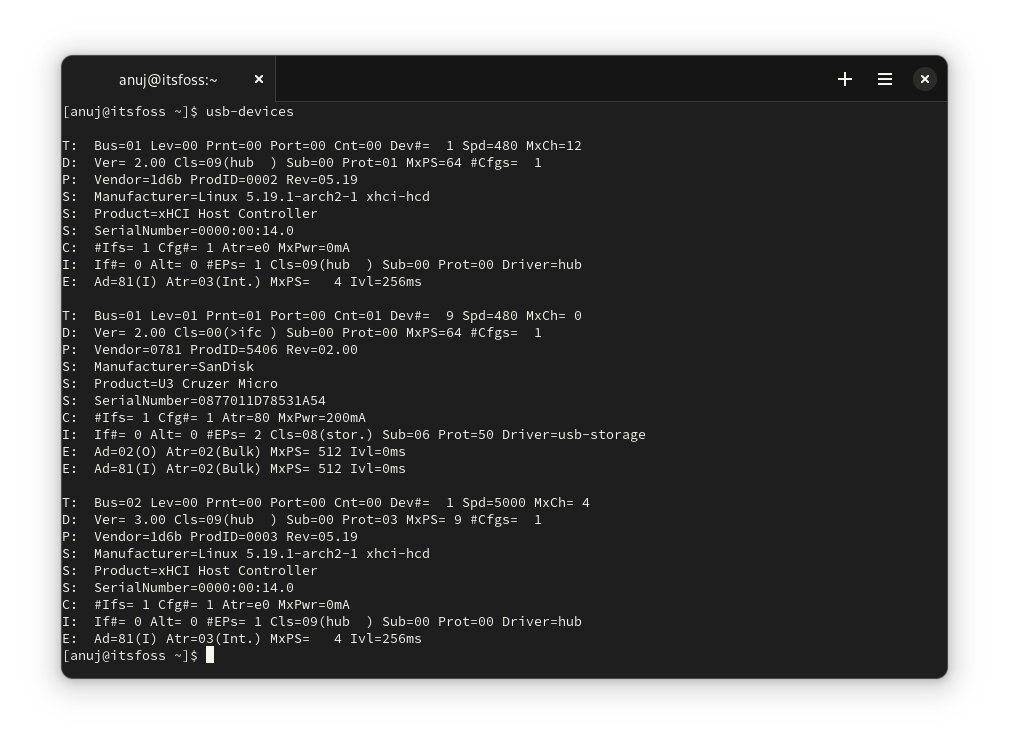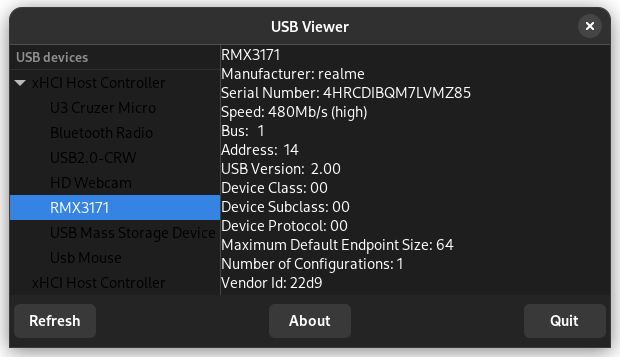- command to determine ports of a device (like /dev/ttyUSB0)
- 7 Answers 7
- Explanation:
- How to List USB Devices Connected to Your Linux System
- Check connected USB devices graphically
- Using the mount command to list the mounted USB devices
- Using df command
- Using lsblk command
- Using fdisk
- Inspecting /proc/mounts
- Display all the USB devices with lsusb command
- Conclusion
command to determine ports of a device (like /dev/ttyUSB0)
I have a question regarding the ports in Linux. If I connect my device via USB and want to check its port I can’t do it using the command lsusb, which only specifies bus number and device number on this bus:
[ziga@Ziga-PC ~]$ lsusb Bus 003 Device 007: ID 0403:6001 Future Technology Devices International, Ltd FT232 USB-Serial (UART) IC Is there a command that tells me the port the device is connected to directly? Only way to do this until now was to disconect and reconnect and using the command:
[ziga@Ziga-PC ~]$ dmesg | grep tty [ 0.000000] console [tty0] enabled [ 0.929510] 00:09: ttyS0 at I/O 0x3f8 (irq = 4) is a 16550A [ 4.378109] systemd[1]: Starting system-getty.slice. [ 4.378543] systemd[1]: Created slice system-getty.slice. [ 8.786474] usb 3-4.4: FTDI USB Serial Device converter now attached to ttyUSB0 What are you trying to accomplish? Do you want to associate a device in /dev with an entry in lsusb ? Or do you want to list all devices in /dev that are derived from a physical USB device? Or are you just wanting ls /dev/ttyUSB* ?
I just need a command which will give me port of a device and will not push me to disconnect and reconnect my devices. ls /dev/ttyUSB* will only list maybee 10 ports but from this list I cannot tell which one is for my device.
I use this Python 3 script all the time, it works perfectly well on Linux, macOS and Raspberry Pi OS: gist.github.com/NicHub/d86d34f2292da017ac20ca1e6a7cb76d
7 Answers 7
I’m not quite certain what you’re asking. You mention ‘port’ several times, but then in your example, you say the answer is /dev/ttyUSB0 , which is a device dev path, not a port. So this answer is about finding the dev path for each device.
Below is a quick and dirty script which walks through devices in /sys looking for USB devices with a ID_SERIAL attribute. Typically only real USB devices will have this attribute, and so we can filter with it. If we don’t, you’ll see a lot of things in the list that aren’t physical devices.
#!/bin/bash for sysdevpath in $(find /sys/bus/usb/devices/usb*/ -name dev); do ( syspath="$" devname="$(udevadm info -q name -p $syspath)" [[ "$devname" == "bus/"* ]] && exit eval "$(udevadm info -q property --export -p $syspath)" [[ -z "$ID_SERIAL" ]] && exit echo "/dev/$devname - $ID_SERIAL" ) done On my system, this results in the following:
/dev/ttyACM0 - LG_Electronics_Inc._LGE_Android_Phone_VS930_4G-991c470 /dev/sdb - Lexar_USB_Flash_Drive_AA26MYU15PJ5QFCL-0:0 /dev/sdb1 - Lexar_USB_Flash_Drive_AA26MYU15PJ5QFCL-0:0 /dev/input/event5 - Logitech_USB_Receiver /dev/input/mouse1 - Logitech_USB_Receiver /dev/input/event2 - Razer_Razer_Diamondback_3G /dev/input/mouse0 - Razer_Razer_Diamondback_3G /dev/input/event3 - Logitech_HID_compliant_keyboard /dev/input/event4 - Logitech_HID_compliant_keyboard Explanation:
find /sys/bus/usb/devices/usb*/ -name dev Devices which show up in /dev have a dev file in their /sys directory. So we search for directories matching this criteria.
We want the directory path, so we strip off /dev .
devname="$(udevadm info -q name -p $syspath)" This gives us the path in /dev that corresponds to this /sys device.
This filters out things which aren’t actual devices. Otherwise you’ll get things like USB controllers & hubs. The exit exits the subshell, which flows to the next iteration of the loop.
eval "$(udevadm info -q property --export -p $syspath)" The udevadm info -q property —export command lists all the device properties in a format that can be parsed by the shell into variables. So we simply call eval on this. This is also the reason why we wrap the code in the parenthesis, so that we use a subshell, and the variables get wiped on each loop.
More filtering of things that aren’t actual devices.
echo "/dev/$devname - $ID_SERIAL" I hope you know what this line does 🙂
Thank you. I will learn a lot from your anwser and now I see that terms werent completely clear to me. Is there any shorter way? Maybee a command already integrated in the Linux itself?
@Walf Yes, that is the purpose. The eval creates unknown variables that differ per device. Without () , when it checks $ID_SERIAL , it could be from a previous device.
You can use this command to explore your device if connected to usb0 :
udevadm info -a -p $(udevadm info -q path -n /dev/ttyUSB0) Assuming that you know what the device you plugged in is, in 14.04 Ubuntu, at least, there is the command usb-devices that you can look through and find the information:
$ usb-devices T: Bus=01 Lev=00 Prnt=00 Port=00 Cnt=00 Dev#= 1 Spd=480 MxCh= 3 D: Ver= 2.00 Cls=09(hub ) Sub=00 Prot=00 MxPS=64 #Cfgs= 1 P: Vendor=1d6b ProdID=0002 Rev=04.04 S: Manufacturer=Linux 4.4.0-131-generic ehci_hcd S: Product=EHCI Host Controller S: SerialNumber=0000:00:1a.0 C: #Ifs= 1 Cfg#= 1 Atr=e0 MxPwr=0mA I: If#= 0 Alt= 0 #EPs= 1 Cls=09(hub ) Sub=00 Prot=00 Driver=hub And the first line lists bus and port, as well as the device number that lsusb gives.
To be fair, as the top answer notes, the question isn’t clear on whether it’s asking for «how do I derive the port» vs «how do I get the exact path?».
I found @phemmer’s accepted answer regularly helpful and turned it into a bash script. I added shell process backgrounding to make it run a bit faster for lots of USB devices connected to a system (which when this is most useful).
#!/bin/bash #findusbdev.sh if [[ "$1" =~ ^(-h|--help)$ ]]; then echo "Find which USB devices are associated with which /dev/ nodes Usage: $0 [-h|--help] [searchString] -h | --help Prints this message searchString Print only /dev/ of matching output With no arguments $0 prints information for all possible USB device nodes E.g. $0 \"FTDI_FT232\" - will show /dev/ttyUSBX for a device using the FTDI FT232 chipset. " exit 0 fi devs=$( ( for sysdevpath in $(find /sys/bus/usb/devices/usb*/ -name dev ); do # ( to launch a subshell here ( syspath="$" devname="$(udevadm info -q name -p $syspath)" [[ "$devname" == "bus/"* ]] && exit eval "$(udevadm info -q property --export -p $syspath)" [[ -z "$ID_SERIAL" ]] && exit echo "/dev/$devname - $ID_SERIAL" )& # & here is causing all of these queries to run simultaneously done # wait then gives a chance for all of the iterations to complete wait # output order is random due to multiprocessing so sort results ) | sort ) if [ -z "$1" ]; then echo "$" else echo "$" | grep "$1" | awk '' fi $ ./findusbdev.sh /dev/input/event15 - Peppercon_AG_Multidevice_E999EC989B0BAFB78F9F225288EC6B0A /dev/input/event16 - Peppercon_AG_Multidevice_E999EC989B0BAFB78F9F225288EC6B0A /dev/input/mouse0 - Peppercon_AG_Multidevice_E999EC989B0BAFB78F9F225288EC6B0A /dev/ttyUSB0 - FTDI_FT230X_Basic_UART_D308B2AI /dev/ttyUSB1 - FTDI_FT232R_USB_UART_AH07DPSR $ ./findusbdev.sh FT230X /dev/ttyUSB0 $ ./findusbdev.sh -h Find which USB devices are associated with which /dev/ nodes Usage: ./findusbdev.sh [-h|--help] [searchString] -h | --help Prints this message searchString Print only /dev/ of matching output With no arguments ./findusbdev.sh prints information for all possible USB device nodes E.g. ./findusbdev.sh "FTDI_FT232" - will show /dev/ttyUSBX for a device using the FTDI FT232 chipset. How to List USB Devices Connected to Your Linux System
Mostly, people are interested in knowing what USB devices are connected to the system. This may help troubleshoot the USB devices.
The most reliable way is to use this command:
It shows the webcam, Bluetooth, and Ethernet ports along with the USB ports and mounted USB drives.
But understanding the output of lsusb is not easy and you may not need to complicate things when you just want to see and access the mounted USB drives.
I will show you various tools and commands you can use to list USB devices connected to your system.
I have connected a 2GB pen-drive, 1TB external HDD, Android smartphone via MTP and USB mouse in the examples unless stated otherwise.
Let me start with the simplest of the options for desktop users.
Check connected USB devices graphically
Your distribution file manager can be used to view USB storage devices connected to your computer. As you can see in the screenshot of Nautilus (GNOME File Manager) below.
The connected devices are shown in the sidebar (Only USB Storage devices are shown here).
You can also use GUI applications like GNOME Disks or Gparted to view, format, and partition the USB Storage devices connected to your computer. GNOME Disks is preinstalled in most distributions using GNOME Desktop Environment by default.
This app also works as a very good partition manager too.
Enough of the Graphical tools. Let us discuss the commands you can use for listing the USB devices.
Using the mount command to list the mounted USB devices
The mount command is used for mounting partitions in Linux. You can also list USB storage devices using the same command.
Generally, USB storage is mounted in the media directory. Thus, filtering the output of mount command on media will give you the desired result.
Using df command
df command is a standard UNIX command used to know the amount of available disk space. You can also use this command to list USB storage devices connected using the command below.
Using lsblk command
The lsblk command is used to list block devices in the terminal. So, here also by filtering the output containing media keyword, you can get the desired result as shown in the screenshot below.
If you are more curious, you can use the blkid command to know the UUID, Label, Block size etc.
This command gives more output as your internal drives are also listed. So, you have to take references from the above command to identify the device you wish to know about.
Using fdisk
fdisk, the good old command line partition manager, can also list the USB storage devices connected to your computer. The output of this command is also very long. So, usually, the connected devices get listed at the bottom as shown below.
Inspecting /proc/mounts
By inspecting the /proc/mounts file, you can list the USB Storage devices. As you can notice, it shows you the mount options being used by filesystem along with the mount point.
cat /proc/mounts | grep mediaDisplay all the USB devices with lsusb command
And we revisit the famed lsusb command.
Linux kernel developer Greg Kroah-Hartman developed this handy usbutils utility. This provides us with two commands i.e. lsusb and usb-devices to list USB devices in Linux.
The lsusb command lists all the information about the USB bus in the system.
As you can see this command also shows the Mouse and Smartphone I have connected, unlike other commands (which are capable of listing only USB storage devices).
The second command usb-devices gives more details as compared but fails to list all devices, as shown below.
Greg has also developed a small GTK application called Usbview. This application shows you the list of all the USB devices connected to your computer.
The application is available in the official repositories of most Linux distributions. You can install usbview package using your distribution’s package manager easily.
Once installed, you can launch it from the application menu. You can select any of the listed devices to get details, as shown in the screenshot below.
Conclusion
Most of the methods listed are limited to USB storage devices. There are only two methods which can list other peripherals also; usbview and usbutils. I guess we have one more reason to be grateful to the Linux Kernel developer Greg for developing these handy tools.
I am aware that there are many more ways to list USB devices connected to your system. Your suggestions are welcome.
